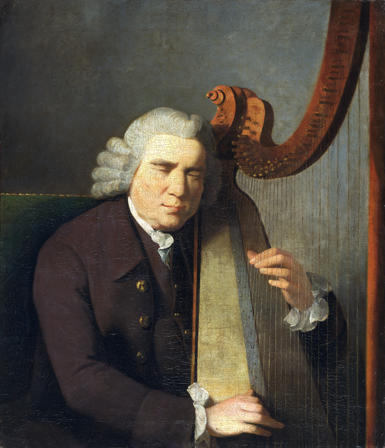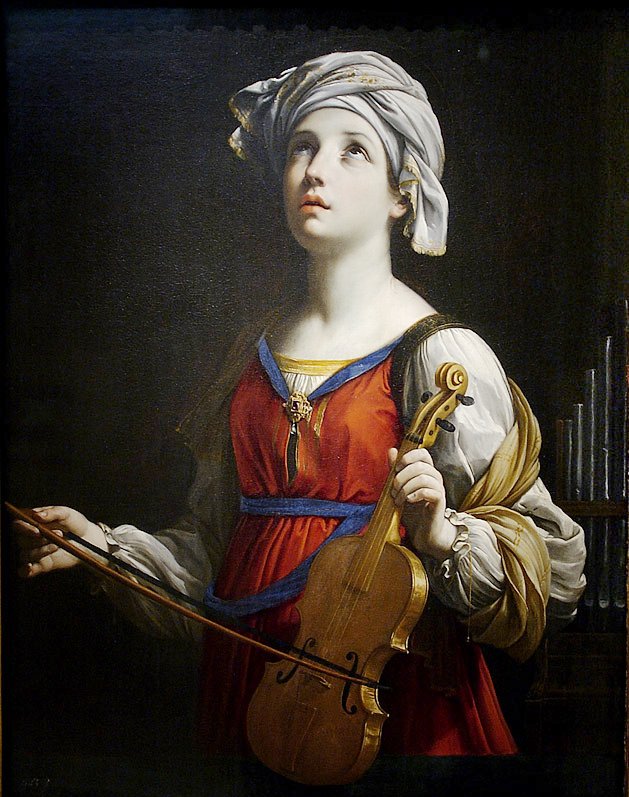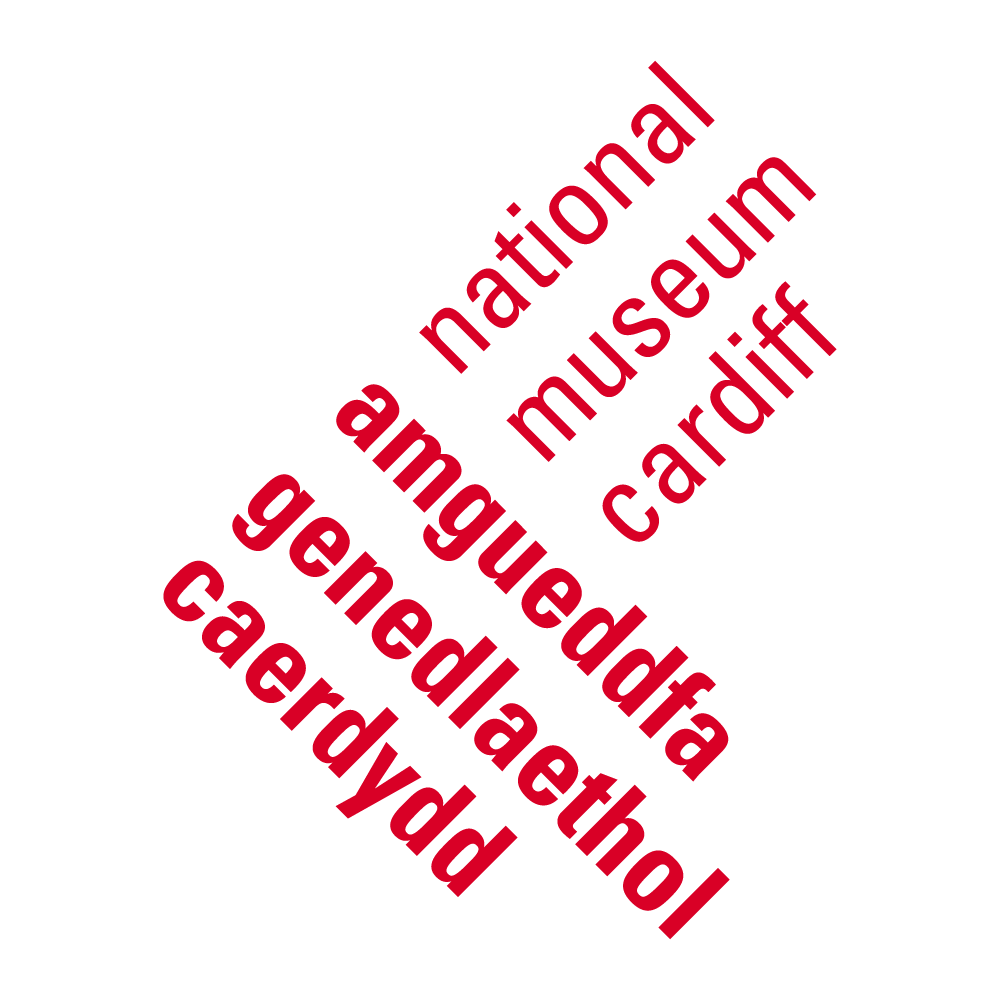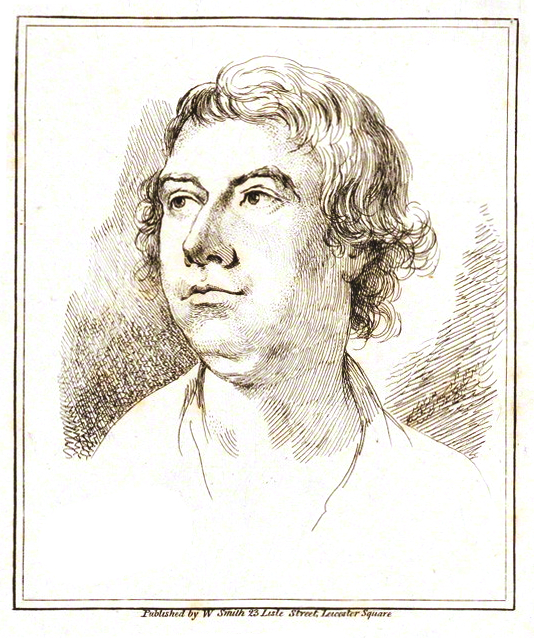|
John Parry (harpist)
John Parry (c.1710 – 7 October 1782), known as ''Parri Ddall, Rhiwabon'' (or, in English, ''Blind Parry of Ruabon'') was born in the Llŷn Peninsula, Caernarfonshire, now Gwynedd, in Wales, and was blind from birth. His first patrons were the Griffiths family, of the Cefn Amwlch estate at Bryn Cynan on Pen Llŷn, who provided the young Parry with a Welsh triple harp. He later became harpist to Sir Watkin Williams-Wynn at Wynnstay, Ruabon and became a master of the High Baroque. He lived on the Wynnstay estate but spent much of his time at the Williams-Wynn's London home where he performed on the Welsh triple harp for London's cultural elite. Parry became a member of the Royal Society of Musicians in 1763. He inspired Thomas Gray to write his 1757 poem, ''The Bard''. It is also claimed that Parri first wrote down – or dictated to his fellow-compiler Evan Williams – in his manuscript ''Antient British Music'' (1741) a then unnamed 'aria' which is now world-famous as " Deck ... [...More Info...] [...Related Items...] OR: [Wikipedia] [Google] [Baidu] |
John Parry, Harpist
John is a common English name and surname: * John (given name) * John (surname) John may also refer to: New Testament Works * Gospel of John, a title often shortened to John * First Epistle of John, often shortened to 1 John * Second Epistle of John, often shortened to 2 John * Third Epistle of John, often shortened to 3 John People * John the Baptist (died c. AD 30), regarded as a prophet and the forerunner of Jesus Christ * John the Apostle (lived c. AD 30), one of the twelve apostles of Jesus * John the Evangelist, assigned author of the Fourth Gospel, once identified with the Apostle * John of Patmos, also known as John the Divine or John the Revelator, the author of the Book of Revelation, once identified with the Apostle * John the Presbyter, a figure either identified with or distinguished from the Apostle, the Evangelist and John of Patmos Other people with the given name Religious figures * John, father of Andrew the Apostle and Saint Peter * Pope John ... [...More Info...] [...Related Items...] OR: [Wikipedia] [Google] [Baidu] |
The Bard (poem)
''The Bard. A Pindaric Ode'' (1757) is a poem by Thomas Gray, set at the time of Edward I's conquest of Wales. Inspired partly by his researches into medieval history and literature, partly by his discovery of Welsh harp music, it was itself a potent influence on future generations of poets and painters, seen by many as the first creative work of the Celtic Revival and as lying at the root of the Romantic movement in Britain. Synopsis As the victorious army of Edward I marches along the slopes of the Snowdonian mountains near to the river Conwy they encounter a Welsh bard, who curses the king. The bard invokes the shades of Cadwallo, Urien and Mordred, three of Edward's victims, who weave the fate of Edward's Plantagenet line, dwelling on the various miseries and misfortunes of his descendants. The bard goes on to predict the return of Welsh rule over Britain in the form of the house of Tudor, and the flowering of British poetry in the verse of Spenser, Shakespeare ... [...More Info...] [...Related Items...] OR: [Wikipedia] [Google] [Baidu] |
People From Gwynedd
A person ( : people) is a being that has certain capacities or attributes such as reason, morality, consciousness or self-consciousness, and being a part of a culturally established form of social relations such as kinship, ownership of property, or legal responsibility. The defining features of personhood and, consequently, what makes a person count as a person, differ widely among cultures and contexts. In addition to the question of personhood, of what makes a being count as a person to begin with, there are further questions about personal identity and self: both about what makes any particular person that particular person instead of another, and about what makes a person at one time the same person as they were or will be at another time despite any intervening changes. The plural form "people" is often used to refer to an entire nation or ethnic group (as in "a people"), and this was the original meaning of the word; it subsequently acquired its use as a plural form of per ... [...More Info...] [...Related Items...] OR: [Wikipedia] [Google] [Baidu] |
Blind Musicians
Blind musicians are singers or instrumentalists, or in some cases singer-accompanists, who are legally blind. Resources Historically, many blind musicians, including some of the most famous, have performed without the benefit of formal instruction, since such instruction relies extensively on written musical notation. However, today there are many resources available for blind musicians who wish to learn Western music theory and classical notation. Louis Braille, the man who created the braille alphabet for the blind, also created a system of classical notation for the blind called Braille music. This system allows the blind to read and write music much as the sighted do. The largest collection of Braille musical scores is located at the Library of Congress in Washington, D.C. Outside the U.S., the largest collection of braille music scores is stored at the National Library for the Blind in England. Computer technology and the Internet make it possible in theory for blind m ... [...More Info...] [...Related Items...] OR: [Wikipedia] [Google] [Baidu] |
Welsh Harpists
Welsh may refer to: Related to Wales * Welsh, referring or related to Wales * Welsh language, a Brittonic Celtic language spoken in Wales * Welsh people People * Welsh (surname) * Sometimes used as a synonym for the ancient Britons (Celtic people) Animals * Welsh (pig) Places * Welsh Basin, a basin during the Cambrian, Ordovician and Silurian geological periods * Welsh, Louisiana, a town in the United States * Welsh, Ohio, an unincorporated community in the United States See also * Welch (other) Welch, Welch's, Welchs or Welches may refer to: People *Welch (surname) Places * Welch, Oklahoma, a town, US *Welches, Oregon, an unincorporated community, US *Welch, Texas, an unincorporated community, US * Welchs, Virginia, an unincorporated c ... * * * Cambrian + Cymru {{Disambiguation Language and nationality disambiguation pages ... [...More Info...] [...Related Items...] OR: [Wikipedia] [Google] [Baidu] |
Cardiff
Cardiff (; cy, Caerdydd ) is the capital and largest city of Wales. It forms a principal area, officially known as the City and County of Cardiff ( cy, Dinas a Sir Caerdydd, links=no), and the city is the eleventh-largest in the United Kingdom. Located in the south-east of Wales and in the Cardiff Capital Region, Cardiff is the county town of the historic county of Glamorgan and in 1974–1996 of South Glamorgan. It belongs to the Eurocities network of the largest European cities. A small town until the early 19th century, its prominence as a port for coal when mining began in the region helped its expansion. In 1905, it was ranked as a city and in 1955 proclaimed capital of Wales. Cardiff Built-up Area covers a larger area outside the county boundary, including the towns of Dinas Powys and Penarth. Cardiff is the main commercial centre of Wales as well as the base for the Senedd. At the 2021 census, the unitary authority area population was put at 362,400. The popula ... [...More Info...] [...Related Items...] OR: [Wikipedia] [Google] [Baidu] |
National Museum Cardiff
National Museum Cardiff ( cy, Amgueddfa Genedlaethol Caerdydd) is a museum and art gallery in Cardiff, Wales. The museum is part of the wider network of Amgueddfa Cymru – National Museum Wales. Entry is kept free by a grant from the Welsh Government; however, they do ask for donations throughout the museum. History The National Museum of Wales was founded in 1905, with its royal charter granted in 1907. Part of the bid for Cardiff to obtain the National Museum for Wales included the gift of the Cardiff Museum Collection, then known as "Welsh Museum of Natural History, Archaeology and Art," which was formally handed over in 1912. The Cardiff Museum was sharing the building of Cardiff Library, and was a sub-department of the library until 1893. Construction of a new building in the civic complex of Cathays Park began in 1912, but owing to the First World War it did not open to the public until 1922, with the official opening taking place in 1927. The architects were Arnold Dun ... [...More Info...] [...Related Items...] OR: [Wikipedia] [Google] [Baidu] |
William Parry (artist)
William Parry (2 May 1743 – 12 February 1791) was a Welsh artist. Primarily a portrait painter, he attracted extensive patronage in Wales due to his connections with Sir Watkin Williams-Wynn, 4th Baronet. He was the son of John Parry, a blind harpist who held a key position in the household of Sir Watkin Williams-Wynn, 3rd Baronet of Wynnstay, Denbighshire, the wealthiest and most powerful Welshman of the time. At the age of sixteen he enrolled at William Shipley's drawing academy, later becoming a pupil to Joshua Reynolds. In late 1769 or early 1770 he returned to Wales, where the Wynnstay estate had lately been inherited by the third baronet's son, an art lover who had just returned from his Grand Tour. He also received commissions for chalk and painted portraits from others in the Welsh gentry. Sir Watkin funded Parry's own Grand Tour in 1770–5, during which he produced full-scale copies of paintings by Raphael and Correggio. In 1776 he was elected an Associate of the ... [...More Info...] [...Related Items...] OR: [Wikipedia] [Google] [Baidu] |
British Newspaper Archive
The British Newspaper Archive web site provides access to searchable digitized archives of British and Irish newspapers. It was launched in November 2011. History The British Library Newspapers section was based in Colindale in north London, until 2013, and is now divided between the St Pancras and Boston Spa sites. The library has an almost complete collection of British and Irish newspapers since 1840. This is partly because of the legal deposit legislation of 1869, which required newspapers to supply a copy of each edition of a newspaper to the library. London editions of national daily and Sunday newspapers are complete back to 1801. In total, the collection consists of 660,000 bound volumes and 370,000 reels of microfilm containing tens of millions of newspapers with 52,000 titles on 45 km of shelves. After the closure of Colindale in November 2013, access to the 750 million original printed pages was maintained via an automated and climate-controlled storage facilit ... [...More Info...] [...Related Items...] OR: [Wikipedia] [Google] [Baidu] |
List Of Newspapers In The United Kingdom
Twelve daily newspapers and eleven Sunday-only weekly newspapers are distributed nationally in the United Kingdom. Others circulate in Scotland only and still others serve smaller areas. National daily newspapers publish every day except Sundays and 25 December. Sunday newspapers may be independent; e.g. ''The Observer'' was an independent Sunday newspaper from its founding in 1791 until it was acquired by ''The Guardian'' in 1993. Many daily newspapers now have Sunday editions, usually with a related name (e.g. ''The Times'' and ''The Sunday Times''), but are editorially distinct. UK newspapers can generally be split into two distinct categories: the more serious and intellectual newspapers, usually referred to as the broadsheets, and sometimes known collectively as 'the quality press', and others, generally known as tabloids, and collectively as 'the popular press', which have tended to focus more on celebrity coverage and human interest stories rather than political reportin ... [...More Info...] [...Related Items...] OR: [Wikipedia] [Google] [Baidu] |
Deck The Halls
"Deck the Hall” is a traditional Christmas carol. The melody is Welsh, dating back to the sixteenth century, and belongs to a winter carol, "Nos Galan", while the English lyrics, written by the Scottish musician Thomas Oliphant, date to 1862. Lyrics The English-language lyrics were written by the Scottish musician Thomas Oliphant. They first appeared in 1862, in volume 2 of ''Welsh Melodies'', a set of four volumes authored by John Thomas, including Welsh words by John Jones (Talhaiarn) and English words by Oliphant. The original English lyrics, as published in 1862, run as follows (later variants are discussed below): The phrase " 'Tis the season", from the lyrics, has become synonymous with the Christmas and holiday season, 'tis being an archaic contraction of "it is". Variants A variation of the lyrics appears in the December 1877 issue of the ''Pennsylvania School Journal''. This version, in which there is no longer any reference to drinking, runs as follow ... [...More Info...] [...Related Items...] OR: [Wikipedia] [Google] [Baidu] |
Thomas Gray
Thomas Gray (26 December 1716 – 30 July 1771) was an English poet, letter-writer, classics, classical scholar, and professor at Pembroke College, Cambridge, Pembroke College, Cambridge. He is widely known for his ''Elegy Written in a Country Churchyard,'' published in 1751. Gray was a Self-criticism, self-critical writer who published only 13 poems in his lifetime, despite being very popular. He was even offered the position of Poet laureate, Poet Laureate in 1757 after the death of Colley Cibber, though he declined. His writing is conventionally considered to be Preromanticism, pre-Romantic but recent critical developments deny such Teleology, teleological classification. Early life and education Thomas Gray was born in Cornhill, London. His father, Philip Gray, was a scrivener and his mother, Dorothy Antrobus, was a milliner. He was the fifth of twelve children, and the only one to survive infancy.John D. Baird, 'Gray, Thomas (1716–1771)', ''Oxford Dictionary of National ... [...More Info...] [...Related Items...] OR: [Wikipedia] [Google] [Baidu] |


_1938.jpg)




